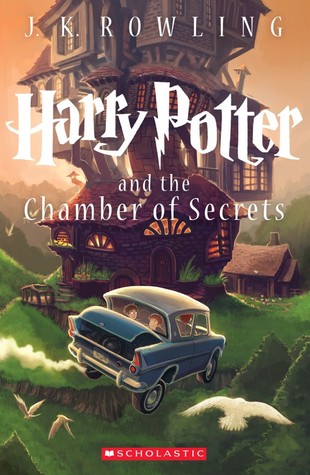 As everyone who hasn't been living under a rock since the 1990s is aware, Harry Potter and the Chamber of Secrets is the second book in J. K. Rowling's Harry Potter series, in which the eponymous Harry Potter continues his studies at Hogwarts School of Witchcraft and Wizardry and takes on the dark magic master Lord Voldemort, as is his destiny. What is there to say about this book that hasn't been said hundreds of times already? Not much, so I'll make this fast.
As everyone who hasn't been living under a rock since the 1990s is aware, Harry Potter and the Chamber of Secrets is the second book in J. K. Rowling's Harry Potter series, in which the eponymous Harry Potter continues his studies at Hogwarts School of Witchcraft and Wizardry and takes on the dark magic master Lord Voldemort, as is his destiny. What is there to say about this book that hasn't been said hundreds of times already? Not much, so I'll make this fast.Unlike Harry Potter and the Sorcerer's Stone, which was all I remembered it being, I didn't like Chamber of Secrets as much as I did the first time or two I read it; now, granted, the most recent time I read it was six or seven years ago, but still. It starts off with quite a bit of re-hashing what happened in the first book, which isn't something I'm really a fan of; if you absolutely need to recap things because it's been a while since your last book came out and you can't expect people to re-read it before moving on to the second, I still think you can work in a summary in a manner that's a bit more complex than "This happened. Now this is happening."
Anyway. In Chamber of Secrets, Harry goes on with school while dodging somewhat questionable "rescue" attempts by the house elf Dobby and trying to figure out what's happening to students (and a cat) who keep turning up petrified, all while hearing voices that no one else can hear. The Defense Against the Dark Arts teacher for the year is Gilderoy Lockheart, who is absolutely fabulous in pretty much every sense of the word; not downright evil on the inside, like Quirrel was, but with his own sinister twist that makes his shiny demeanor all the more interesting. On the other hand, I didn't like Dobby...at all. Really. I honestly don't see what everyone finds so endearing about Dobby. He has terrible ideas of how to go about saving someone and honestly, nothing in this book would have been any different if Dobby hadn't stepped in; he's a minor inconvenience, at best, not an integral part of the book's structure or plot.
Also befuddling to me is why the Chamber of Secrets go opened at all. Now, with some spoilers for everyone who has been living under a rock since the 1990s: as the rest of us know, Tom Riddle's diary ends up being one of the seven Horcruxes in which Voldemort put a part of his soul. Somehow this diary manages to suck the life out of people who write in it, and gives sixteen-year-old Tom Riddle a semblance of life in the process. Lucius Malfoy plants the book in Ginny Weasely's belongings, and so the whole Chamber of Secrets fiasco gets started when she begins to unwittingly pour her heart out to it. But what does bringing back a partial, sixteen-year-old version of Voldemort actually accomplish? Closing Hogwarts? Was that the end goal here? Because, honestly, that's a pretty lame end goal. Was it to destroy Harry? Because that doesn't really seem like it was ever going to be accomplished without Harry actually going down to the Chamber which was, apparently, not part of the plan. Was it to bring Voldemort back? But we know that couldn't work because the Horcrux might keep him from dying entirely, but it can't actually bring him back, we see how that is accomplished in Goblet of Fire and it's quite a bit more complex than getting an eleven-year-old to write in a diary. I'm completely befuddled at this point. Honestly, it seems like Lucius Malfoy did it just to be...well, bad. And impress the Dark Lord who he doesn't even know is still around. What? I'm confused. That doesn't seem like the best use of his evil energies, quite frankly.
Don't get me wrong; we all know that Rowling is a great storyteller and has some wonderful characters and world-building in her head (though sometimes I wonder how much of it was actually planned out in advance and how much she just went along with, and how much we have over-analyzed these books). But, for this one, I feel like it was just a way to kill Harry's second year while waiting for something more interesting to come along, and that it was worked in much better later in the series than in this book itself. Still, a quick and enjoyable read, if one that's more palatable in the context of the whole than on its own merits.
3 stars out of 5.
No comments:
Post a Comment